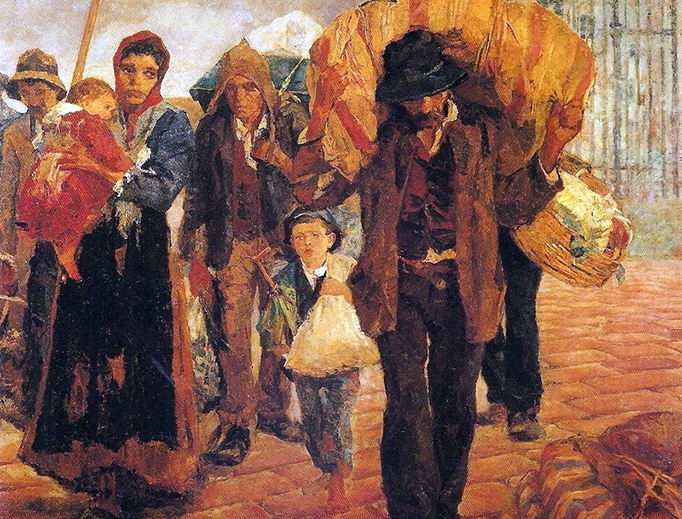Welcoming the Stranger Then and Now
“Public authorities should see to it that the natural right is respected that places a guest under the protection of those who receive him.” (CCC 2241)

While we have been to the Minnesota History Center many times, last week was the first time my family and I went to the Open House exhibit. This exhibit features the history of the people who lived in one house, from the time it was built to the present, in the Railroad Island district of St. Paul, Minnesota. What is striking about the exhibit is how in the course of the existence of this house so many people from so many ethnic backgrounds lived in this house, many of them immigrants. The first residents, who built the house in 1888, were a family of German immigrants. Afterwards the house was made into a duplex and leased to Italian immigrants when the neighborhood became like a Little Italy. Then the house was divided into a triplex. Again it became a home for new citizens as refugees from Vietnam, Thailand, and Laos came to the United States during and after the Vietnam War. For all of these people coming to a new country was not easy, but they all came, expecting the welcome that the United States has been known for from the beginning.
Give me your tired, your poor,
Your huddled masses yearning to breathe free,
The wretched refuse of your teeming shore.
Send these, the homeless, tempest-tost to me,
I lift my lamp beside the golden door... (Emma Lazarus, “The New Colossus”)
I think of my ancestors coming from Lebanon just 100 years ago. They were Middle Eastern Christians making the trip across the ocean, passing through Ellis Island, changing their names, settling in St. Louis, Missouri. My great-great grandfather worked first as a peddler. Maronite Catholics by descent, they became Roman Catholic once in America. His own descendants started a painting company. His grandson, my grandfather, served in the army, earned a college degree, worked as a photographer, collected classical music, and raised seven children with my grandmother. They came from a faraway land, where unrest was always present, to a new land of promise. They found welcome, for they are still here.
But they are not the first immigrants to the United States of my ancestry. It goes back and back. I have ancestors from Scotland, one having fought in the Revolutionary War, his son in the War of 1812. Then another in the same line fought in the Civil War. I have ancestors from the Netherlands; my grandfather is named after his uncle, descended from these ancestors, who was a priest of Cleveland in the late 1800s. My son has the same shaped eyes as this many-great-uncle priest. I have ancestors who came from Ireland and Croatia, to find a new fresh start. I have ancestors who came from Germany, and one descended from that line was a bronze-medal-winning Olympian for the United States. I think of these ancestors seeking a new, a better life, or merely seeking escape from a miserable one. They came to our country, tired, probably poor. And they were taken in, they became a part of this great experiment of liberty. And because of this great mix of people from all over the world, I exist, a walking melting pot of America. And what does being a melting pot do for us? It teaches us to welcome the stranger, a work of mercy, no matter what they may bring.
I am not going to pretend to be a politician and know the right thing for our country, but I am a conservative. I look at the history of our country and the traditions that have been apart of our short lifespan as a nation. As our bishops have reminded us, we have always welcomed the stranger into our nation; when we welcome the stranger the welcome Christ. Let us not forget our duty as human beings to other human beings to extend welcome and mercy and charity. Let us remember that we all came from elsewhere; our ancestors were immigrants and refugees once. And they once came here, to this country, and became new citizens. Let us not forget our duty as Christians, and that the stranger is the one who needs welcome the most. In my adult life, I have moved to new cities three times. All of those times, there have been those who welcomed me, who became my new and dearest friends. If we want to be truly human, we are called to be a part of a community, and that community is local, national, and worldwide. When a person comes to us in need, we cannot refuse. Where would we be if those who came before us in their need were turned away?
- Keywords:
- immigration
- refugees

















